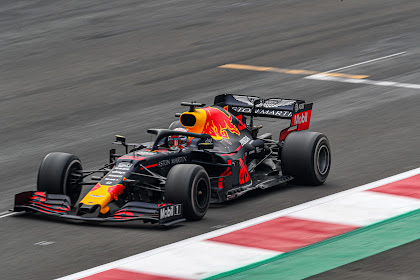The Red Bull budget cap breach in F1: From regulations to necessary changes.
Abstract
Starting from an analysis of the
F1 Financial Regulations and the recent regulatory breach done by F1 Red Bull
team, this article has the aim to understand why the current system is not able
to be really effective in formula one's financial monitoring and how it could
be improved.
The Budget cap and the F1 Financial Regulations
The Budget cap is one of the most relevant additions to
the new set of regulation created to establish a new era in Fomula One
history. The budget cap and its
procedures were introduced by FIA’s Financial Regulations from the 2021 F1 season.
The aim of the Financial Regulations is to improve the financial sustainability
of Formula One teams, meanwhile ensuring the long-term viability of the
Championship and mitigating the gap in performance between competitors.
This intricate regulation establishes a new board
called “Cost Cap Administration”[1], which is responsible
for administering and monitoring the compliance with the Financial Regulations
of the F1 teams. It can also investigate instances of suspected non-compliance
through the auditing process or by launching full investigations and, furthermore,
taking appropriate enforcement action in respect of any alleged breaches.
The breaches, as described in the art. 8 of the
Regulations, can be divided in three categories:
a) Procedural breach: violation only related to procedural aspects
of the Regulations, i.e. submitting the financial report after the deadline.
b) Minor Overspend
breach: violation of the
budget cap fixed amount with a surplus discrepancy that can be contained to 5%.
c) Material Overspend
Breach: it’s the most
relevant breach possible and arises when the discrepancy between the cost cap
and the amount spent by a team is more than 5%.[2]
The CCA has a plethora of possible actions in dealing
with an alleged breach of the Financial Regulations. It can start the procedure
to draft a settlement, referred to as an “Accepted
Breach Agreement”[3],
with the Competitor concerned in case of Procedural Breach or Minor Overspend
Breach, or, if it is impossible to reach an agreement regarding the violation, it
can also refer the case to the “Cost Cap
Adjudication Panel”[4].
The CCAP is a board created for judging the breach of the Financial Regulation
and is described in the article 7. Its decisions can be appealed to the FIA
International Court of appeal. In the event of an alleged Major Overspend
Breach, the CCA must refer the case to the CCAP and could not use the
aforementioned ABA procedure.
The
Red Bull’s breach case
After a lot of speculation in the paddock, with the
submission of the first financial reports related to the 2021 F1 Championship,
the worries about a budget cap’s breach by the team of the former world drivers
champion has become reality.
The effective breach, as the documents stand, is not
so relevant as predicted and the CCA decided to proceed with an ABA with Red
Bull Racing team. The actual violation is about 1.6 % of overspending related
to the budget cap for 2021 season. Nevertheless, after some recalculation,
linked to tax issues, the breach is considered only of 0.37%.
The ABA, accepted by Red Bull, states the following
penalties for the Milton Keynes team:
a)
A financial penalty
of USD 7,000,000.
b)
A limitation to conduct aerodynamic Testing during a
period of 12 months from the date of execution of the ABA through the
application of a reduction of 10% of the wind tunnel limitation stated by
Formula 1 Sporting Regulations.
It is clear that the financial penalty is irrelevant
for a company like Red Bull, but the testing limitation could affect the
competitiveness of the team for the 2023’s championship.
However, the most relevant provision is related to the
circumstance of another breach by Red Bull. As stated, in that case of a new
violation, it will be directly handled by a CCAP.[5]
This is really important because, during 2022 season, Red Bull’s top management
has stated more than once that they will not be able to comply with 2022’s cost
cap.
This situation has generated a strong friction between
Federation and other teams that, due to the impossibility to appeal the
agreement, are threating to violate the regulation as Red Bull done.
What are the needed changes?
To avoid a rapid escalation of this tinderbox, in an
already tense environment, FIA must take actions to make this Regulations as
effective as possible. The first useful change will be the abolition of the
ABA. This agreement, considering that is written in synergy with the breaching
team and is also not appealable, can only be seen as a way to reduce equality
and clarity and could only be maintained, if suitable, in case of Procedural
breaches, which are not creating any damage to the fairness and competitiveness
of the championship.
The second improvement can be seen in a more detailed
description of costs. This measure will avoid tricky budget allocation made by
teams to circumvent the regulations. The best way of
doing this modification is by adding an appendix with a detailed explanation of
costs in relation of the most critical issues: Third parties and Top management
salaries.
The third relevant measure, that could improve the
current Regulation, is to provide a mechanism that sanctions in a stronger way
a team that commits more than one infringement. This would avoid that the first
years of this new Regulations could be used by the teams as “explorative ones”,
with the aim of finding grey areas connected with the certainty to not be
severely punished by the CCA.
The last thing that needs to be addressed, even if it will
not be an easy one to solve, is the actual timing of the verification-sanction procedure
and its impact on concluded championships. Just considering the aforementioned
case, Red Bull has been penalized in 2022 for the 2021 Championship and, if the
words of Red Bull top management were true, they would risk having a stronger penalty for 2022
championship, but only in 2023, when all is already set and done. This
situation, in case of huge Material breaches, could lead to a total uncertainty
on the championship results for an amount of time that can’t be suitable with
the fastest pace of the current Formula One.
In the end, the Formula 1 Financial Regulations is
still in its infancy and, for this reason, now is the best time to amend the
unavoidable juvenile issues of a such complex and ambitious regulation. On the
other hand, it’s fundamental to understand that those critical areas, if not addressed
properly, will have a really huge and negative impact on Formula 1’s
credibility and competitiveness.
[1] From now onwards “CCA”.
[2] Art.8, Formula 1 Financial Regulations, FIA, 2022
[3] From now onwards “ABA”.
[4] From now onwards “CCAP”.
[5] Accepted breach agreement between Red Bull racing team and the Fia
for breach of the 2021 Fia Formula One Financial Regulations, Fédération Internationale de l’Automobile, 2022.




Commenti
Posta un commento